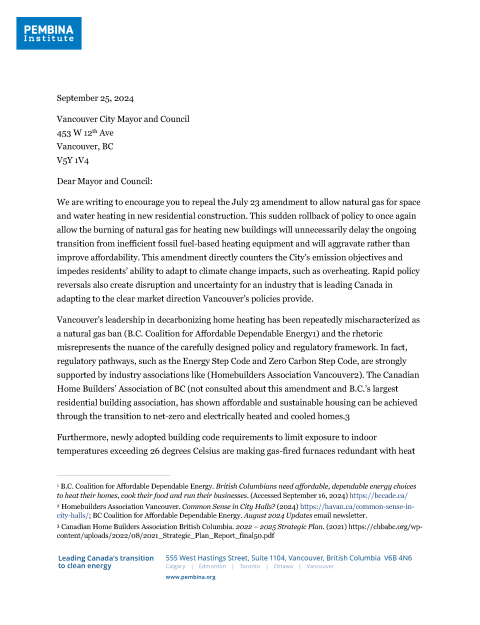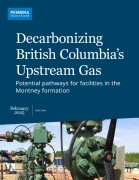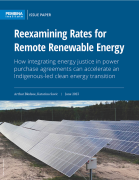We are writing to encourage you to repeal the July 23 amendment to allow natural gas for space and water heating in new residential construction. This sudden rollback of policy to once again allow the burning of natural gas for heating new buildings will unnecessarily delay the ongoing transition from inefficient fossil fuel-based heating equipment and will aggravate rather than improve affordability. This amendment directly counters the City’s emission objectives and impedes residents’ ability to adapt to climate change impacts, such as overheating. Rapid policy reversals also create disruption and uncertainty for an industry that is leading Canada in adapting to the clear market direction Vancouver’s policies provide.
Vancouver’s leadership in decarbonizing home heating has been repeatedly mischaracterized as a natural gas ban (B.C. Coalition for Affordable Dependable Energy) and the rhetoric misrepresents the nuance of the carefully designed policy and regulatory framework. In fact, regulatory pathways, such as the Energy Step Code and Zero Carbon Step Code, are strongly supported by industry associations like (Homebuilders Association Vancouver). The Canadian Home Builders’ Association of BC (not consulted about this amendment and B.C.’s largest residential building association), has shown affordable and sustainable housing can be achieved through the transition to net-zero and electrically heated and cooled homes.
Furthermore, newly adopted building code requirements to limit exposure to indoor temperatures exceeding 26 degrees Celsius are making gas-fired furnaces redundant with heat pumps that can provide both heating and cooling, ultimately increasing costs. Research by the City of Vancouver’s Zero Emissions Innovation Centre and BC Housing’s Research Centre has shown that high performance electrically-heated buildings can achieve design and construction costs on par or less than gas-powered buildings, demonstrating that all-electric buildings do not interfere with affordability objectives. Studies and operational performance data have also shown that homes with highly efficient electric heat pumps cost less to operate than those with natural gas furnaces, while having the added benefit of being able to cool during hot weather. In the most basic terms, locking in natural gas also locks in unnecessary cost burdens for your constituency.
Without question, liquid and gaseous fuels will continue to play a role in B.C. in some regions and for uses that are hard to electrify, as recognized in the BC Clean Energy Strategy. That said, research by FortisBC and the Government of BC shows the amount of renewable natural gas available to British Columbians will not be enough to simply swap out natural gas use. That same report indicates that hydrogen is not a suitable replacement at scale without significant upgrades to transmission and heating equipment. Precious clean gaseous energy resources should be reserved for other uses given highly efficient all-electric homes are already standard in today’s market. The shift to highly efficient homes and heating equipment, combined with the significant investments in the electricity distribution system, will ensure that clean and reliable electricity will continue to be available into the future.
Burning fossil fuels for space and water heating already accounts for 55% of the City of Vancouver’s carbon pollution. Why build new homes that add to that emissions burden? Fortunately, industry leaders are demonstrating the feasibility of the current pathway toward fully electric and high-performance buildings. During this time of intersecting climate, affordability and housing crises, policies and regulations that attempt to address one without consideration of the other will have unintended consequences, especially when they run counter to evidence-based research and data. Implementing policies and regulations that ensure new buildings in Vancouver are healthy, climate-friendly, and affordable, today and in the future is the most straightforward step towards decarbonizing buildings.
Vancouver City Council must stay the course and hold true to its reputation for leadership. We call on Vancouver City Council to continue its support for the implementation of the Zero Emissions Building Plan and maintain the existing approved policy to phase out natural gas in new construction in the interest of promoting long term affordability, climate action, health, and safety for the residents of Vancouver and consistent market signals for industry.






